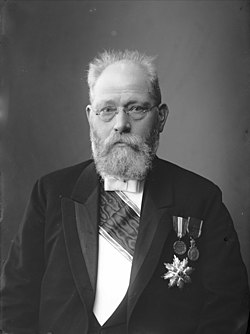Berge's Cabinet | |
|---|---|
| Cabinet of Norway | |
 Prime Minister Abraham Berge. | |
| Date formed | 30 May 1923 |
| Date dissolved | 25 July 1924 |
| People and organisations | |
| Head of state | Haakon VII |
| Head of government | Abraham Berge |
| No. of ministers | 9 |
| Member party | Free-minded Liberal Party Conservative Party |
| Status in legislature | Coalition minority government |
| History | |
| Legislature term | 1922–1925 |
| Predecessor | Bahr Halvorsen's Second Cabinet |
| Successor | Mowinckel's First Cabinet |
Berge's Cabinet was the government of Norway from 30 May 1923 to 25 July 1924. The cabinet was led by Prime Minister Abraham Berge. It succeeded Otto Bahr Halvorsen's second cabinet following his death, and was composed of mostly the same ministers as its predecessor. The cabinet resigned on 23 July 1924, with effect two days later, after not getting wide support in the Storting for an alcohol ban. It was succeeded by Johan L. Mowinckel's first cabinet. [1]